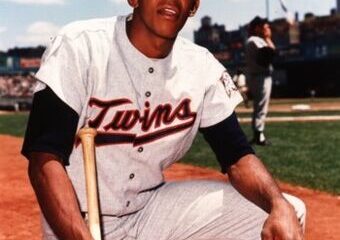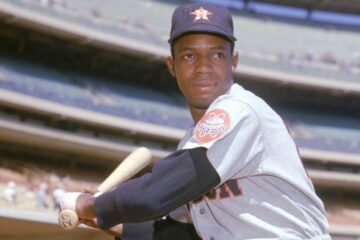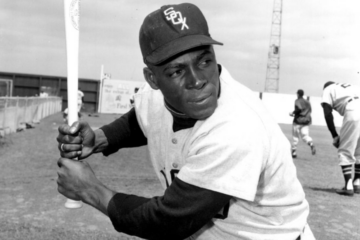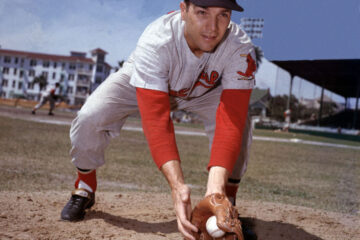The Hall of Fame Index: Who is the most valuable third baseman of all-time?
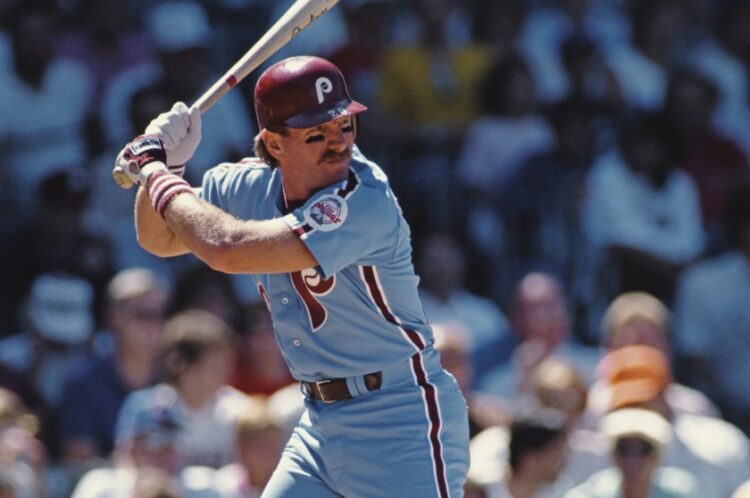
I’ve said it before, but it bears repeating. One of the keys of The Hall of Fame Index is that we go where the data takes us. We can ask lofty questions like who is the most valuable third baseman of all-time and that’s what the headline says, but the issue isn’t really in doubt. That happens sometimes. The more interesting questions happen further down the list. Eddie Mathews is also a very clear second choice which makes everything else the point of debate.
If you have been reading the series you know we have been profiling the top five guys at each position. We could do that here, but it ignores a considerable debate at the fifth slot. The debate also brings up the methodology of the index as well. People that read these articles and the book can’t help but compare the index with other popular player rating systems like JAWS.
This is one of the main reasons why I include offensive numbers, fielding numbers, MVP points, and playoff performance. We want to include as much data as possible before coming down on one side or another in a spirited debate. The index is a great tool, but when all you have is a hammer, every problem begins to look like a nail.
Career Value
| BWAR | FWAR | WS/5 | Total | |
| Mike Schmidt | 106.9 | 106.5 | 93.4 | 306.8 |
| Eddie Mathews | 96.2 | 96.1 | 90.0 | 282.3 |
| George Brett | 88.6 | 84.6 | 86.4 | 259.6 |
| Wade Boggs | 91.4 | 88.3 | 78.8 | 258.5 |
| Adrian Beltre | 93.6 | 84.1 | 74.6 | 252.3 |
| Brooks Robinson | 78.4 | 80.2 | 71.2 | 230.1 |
As you can see, there is very little drama about the top spot. There is also separation between Mathews and the rest of the bunch as well. We go where the data takes us. Immediately, it takes us into a debate between Boggs and Brett. While Brett would appear to be on top, when we are separating two players by only one win we really have not reached a conclusion.
Furthermore, it would appear that Beltre should enter into that conversation. Unfortunately, we have not entered into peak value. Beltre’s peak value will be something of interest as it presents a problem with the methodology of the index. The index takes the top ten consecutive seasons as a player’s peak. This works the vast majority of the time and provides more significant data than a seven year peak or a cherry-picked peak. It doesn’t work in Beltre’s case as he was more inconsistent than a top notch player normally is. We’ll take a look at peak value, but also peer behind the curtain and take a look at where JAWS has them.
Peak Value
| BWAR | FWAR | WS/5 | Total | Index | |
| Schmidt | 79.3 | 78.7 | 66.0 | 224.0 | 530.8 |
| Mathews | 71.3 | 71.4 | 65.2 | 207.9 | 490.2 |
| Boggs | 68.0 | 69.2 | 57.2 | 194.4 | 452.9 |
| Brett | 63.2 | 60.4 | 54.0 | 177.6 | 437.2 |
| Beltre | 56.8 | 47.8 | 40.8 | 145.4 | 397.7 |
| Robinson | 56.2 | 55.4 | 47.8 | 159.4 | 389.5 |
So, you can see that Boggs and Brett end up flip flopping, but it is still pretty close. Furthermore, Brett was not as consistent season to season as Boggs, so if you take the top ten seasons non-consecutively or if you limit it to the top seven then you might get a different answer. The same is true when looking at specifically at peak value for Robinson and Beltre.
Both JAWS and the index consider career and peak value in concert. You really can’t evaluate players in any other way and consider it comprehensive. Before we get to the offensive numbers we should take a look at JAWS and see where it rates these six guys. JAWS averages the career value (BWAR only) with the top seven seasons in what it would call peak value.
| WAR | WAR7 | JAWS | |
| Schmidt | 106.9 | 58.8 | 82.8 |
| Mathews | 96.2 | 53.9 | 75.1 |
| Boggs | 91.4 | 56.4 | 73.9 |
| Beltre | 93.6 | 48.7 | 71.2 |
| Brett | 88.6 | 53.3 | 71.0 |
| Robinson | 78.4 | 45.8 | 62.1 |
It should be noted that Chipper Jones and Ron Santo also beat out Brooks Robinson in the final JAWS rankings. This is where FWAR and win shares come into play. The Orioles were one of the best teams in baseball for over a decade. Playing on a better team obviously helped him in comparison with guys like Santo. However, we should take heart in that both systems found the top five guys without necessarily picking them in the right order.
Of course, what is the right order? How do we differentiate between .2 wins even if we take a system like JAWS as gospel? This is where we need added context. We look at the career and peak offensive and fielding numbers to help us answer these questions. They also provide for some interesting discussion points on their own.
Offensive Numbers
| OPS+ | Rbaser | OW% | wOBA | |
| Schmidt | 148 | -1 | .727 | .395 |
| Mathews | 143 | 1 | .706 | .389 |
| Brett | 135 | 33 | .668 | .374 |
| Boggs | 131 | -8 | .677 | .381 |
| Beltre | 116 | 4 | .574 | .350 |
| Robinson | 105 | 1 | .523 | .322 |
Schmidt and Mathews were actually very similar players offensively. They were not appreciated in their time nearly as much as they would be now. They were low average/high OBP guys. Admittedly, they are the kind of players that new age baseball guys salivate over and traditionalists decry. It’s safe to say they were before their times.
The debate between Boggs and Brett is a fascinating one. Brett was a better base runner and certainly brought more power to the equation. He also won batting titles in three different decades. Boggs was not a great base runner and did not display the power he had during game play, but he got on base and he got on base. When he wasn’t getting on base he was getting on base. I think you get the idea.
Beltre wore out his welcome with random precision. There were isolated seasons where he looked like a monster offensively. You thought he would bust out and become a superstar and then he would return to being a good, but not great offensive player. Again, when we compare their best ten season we are looking at the peak profiled earlier. If we had simply taken the top ten offensive seasons we might see something different, but we need to remain consistent.
| OPS+ | Rbaser | OW% | wOBA | |
| Schmidt | 155 | 9 | .748 | .410 |
| Mathews | 156 | 0 | .734 | .412 |
| Brett | 151 | 27 | .711 | .396 |
| Boggs | 143 | -9 | .716 | .400 |
| Beltre | 124 | 10 | .604 | .361 |
| Robinson | 117 | -1 | .581 | .338 |
Weighted on base average certainly tells a compelling story, but it undersells in the case of Boggs. Between 1985 and 1989, Boggs had 200 hits each season and got on base more than 300 times. In four of those seasons he had both 200+ hits and 100+ walks. His lowest OBP in the period was .430. For the 1980s that was ridiculous. wOBA includes elements of slugging and Boggs obviously falters there. Still, there is no better skill than the ability to steal first base. Boggs was better at it than any other player here.
I suppose one could argue that Mathews was a better peak offensive player than Schmidt. That would partially explain the difference between the two players. Schmidt had a few more productive seasons than Mathews in the end. Of course, the other difference came with the glove. This is also one of those areas where we will have a significant debate.
Fielding Numbers
| Rfield | DWAR | TZ3B | DWS/5 | |
| Robinson | 293 | 39.1 | 294 | 21.3 |
| Beltre | 218 | 27.2 | 196 | 15.9 |
| Schmidt | 127 | 18.4 | 130 | 17.7 |
| Boggs | 104 | 13.9 | 96 | 14.8 |
| Brett | 47 | 2.2 | 54 | 12.3 |
| Mathews | 33 | 5.6 | 32 | 11.8 |
We should start with the obvious. Robinson will not only go down as the best defensive third baseman of all-time, but will challenge for the title of most valuable defensive player of all-time. Certainly, Ozzie Smith will have something to say about that and some may point to Bill Mazeroski as well. We also have not looked other like Graig Nettles and Clete Boyer at third base. That being said, I think we are all comfortable giving Robinson the top spot.
Of course, that begs the next logical question: how much better was he? That depends on your source. Rfield and total zone runs tell one story. Defensive win shares tell a different story. However, that question is an important one as it pertains to the overall value of a player. I’m guessing that Schmidt ends up looking a lot better than people thought. The same is true for Beltre. Yet, it is the combined effect that makes them valuable overall. When you are a brilliant hitter and a brilliant defender you are supremely valuable.
| Rfield | DWAR | TZ3B | DWS/5 | |
| Robinson | 173 | 20.9 | 173 | 12.4 |
| Beltre | 114 | 14.5 | 76 | 8.0 |
| Schmidt | 111 | 16.3 | 111 | 12.5 |
| Boggs | 69 | 10.0 | 74 | 9.9 |
| Brett | 54 | 8.8 | 55 | 8.7 |
| Mathews | 19 | 3.3 | 19 | 7.4 |
If you study these numbers close enough you can see the source of some of the problems with the index in the case of Beltre. His best fielding seasons did not necessarily coincide with his best hitting seasons. The same is actually true of Robinson to a lesser degree. Schmidt was able to put together his best fielding seasons with his best hitting seasons. That is probably why he ends up taking the top spot at third base.
The other interesting aspect is the juxtaposition between our perception of Brett and Boggs and the reality of Brett and Boggs. Most of us naturally assumed Brett was the better all-around player. Certainly when he was at his best (1980, 1985) there was no one better. However, over an extended period of time, Boggs was a more valuable fielder and a more valuable hitter.
Playoff Performance
| PA | SLASH | HR | Runs | RBI | |
| Brett | 184 | .337/.397/.627 | 10 | 30 | 23 |
| Boggs | 174 | .273/.337/.383 | 2 | 15 | 16 |
| Schmidt | 158 | .236/.304/.386 | 4 | 19 | 16 |
| Robinson | 156 | .303/.323/.462 | 5 | 17 | 22 |
| Beltre | 118 | .261/.297/.450 | 5 | 16 | 11 |
| Mathews | 66 | .200/.385/.360 | 1 | 7 | 7 |
Clutch performance is the third rail of statistical analysis. Some classified it as an intangible, but that’s not particularly fair. We can measure it. The question is how much weight we give to it. Brett is obviously a superior playoff performer. Does that mean he should leapfrog Schmidt and Mathews? I think most people would agree that the notion is ridiculous. Should he leapfrog over Boggs? Now, that is an interesting question.
We know that both are very close in the index itself and we know they are relatively close both offensively and defensively. The Royals won only one World Series title where the Red Sox failed in 1986. Maybe that’s the difference between the two. We haven’t looked at the MVP points yet, but if someone wants to say Brett was better because he was better in the playoffs that would be defensible.
BWAR MVP Points
| Top 10 | Top 5 | MVP | PTS | |
| Schmidt | 1 | 8 | 4 | 83 |
| Boggs | 2 | 4 | 3 | 56 |
| Mathews | 3 | 8 | 0 | 49 |
| Robinson | 5 | 2 | 2 | 45 |
| Brett | 3 | 4 | 1 | 39 |
| Beltre | 4 | 3 | 0 | 27 |
The MVP test doesn’t prove anything. None of these tests prove anything. They are all part of a mosaic of data that paints a picture. You could pick Brett in front of Boggs and have plenty of evidence at your disposal. You could pick Boggs in front of Brett and have just as much if not more evidence. If you are rounding out the top five you could do the same with Robinson and Beltre.
What the evidence clearly shows is that Schmidt is the most valuable third baseman in the history of the sport. We could even say he was the greatest, but that gets us into territory that is difficult to prove with any satisfaction. The final exact ranking will likely continue to be debated by those that want a diversion from the present state of affairs.


